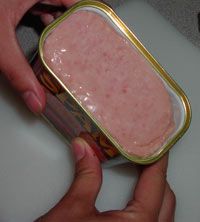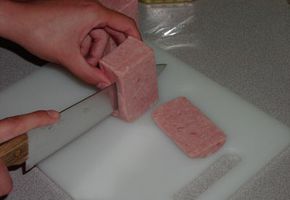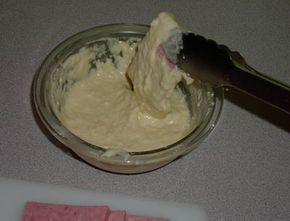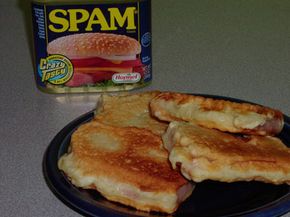Spam is made by the Hormel Foods Corporation. The company was founded by George A. Hormel in the late 1890s in Austin, Minn. By the Great Depression, George's son Jay was heavily involved in the company. Hormel did a successful fresh-meat business, but all fresh meats basically looked similar, which made it difficult for Hormel to make its products stand out. The fresh-meat industry was also bound by seasonal changes in the meat supply. To solve these problems, Jay Hormel put his energies into developing canned meats [source: Wyman].
Canning meat introduced its own problems. Heat often caused cell walls to break down and release all of the water in the meat. The result was dry meat and water in a can. Much experimentation was needed to devise the exact canning process that would leave the meat preserved, yet moist. A precise amount of heat and salt must be used, and it's also important for the meat to be mixed and canned in a vacuum [source: Wyman].
Canned ham was a reasonably successful Hormel product, but Jay Hormel wanted to get some use out of an underutilized cut of meat -- pork shoulders. At first, Spam was made entirely of shoulder meat. Hormel introduced the ham/shoulder blend later. Actor Kenneth Daigneau coined the Spam name in a naming contest at a New Year's Eve party [source: Wyman]. Hormel claims that the word is a blend of the words "spiced ham," though Spam lovers and haters have suggested many other meanings and acronyms over the decades. On May 11, 1937, Spam was officially born when Hormel registered a trademark for the name.
By prominently featuring the brand name on the packaging and spending lavishly on advertising, Hormel succeeded in making Spam a household product in the United States. However, it was World War II that cemented Spam's reputation in its home country and introduced the product to consumers around the world. Before the United States entered the war, Spam and other foods were shipped to Allied countries as part of the lend-lease program. When U.S. soldiers went to Europe and the Pacific, they carried Spam in their K-rations [source: Wyman]. Or did they?
Most of the Spam eaten by soldiers was actually government meat that was canned by Hormel and other companies that were under contract to the military. Only a few soldiers received genuine Spam [source: Wyman]. Nevertheless, to the soldiers it was Spam that they came to know and hate. They felt like they had Spam for every meal and ran out of ways to prepare it. The universal dislike -- they wrote songs about how much they hated the stuff -- probably had less to do with the actual taste of Spam than with how often they were forced to eat it.
Regardless of their opinion on Spam during the war, soldiers who returned to the United States when the war was over brought a taste for Spam with them. With the aid of an advertising blitz, Spam sales increased after the war [source: Wyman].
Since then, Spam has grown and evolved. Hormel has introduced new varieties, including Low-Sodium, Lite, Hickory Smoked, Hot & Spicy and Oven Roasted Turkey. The photo on the label has changed, going from a cooked loaf of Spam dotted with cloves to a Spamburger. There have also been changes in the Spam typeface [source: Spam.com]. Until 1997, the Spam label was lithographed directly onto the cans before cooking. That year, the new "wrap" label was introduced. In 2002, Hormel sold its 6 billionth can of Spam. That's enough cans of Spam to completely fill Giants Stadium in New Jersey, plus enough left over to refill it a third of the way again [source: The Meadowlands].






